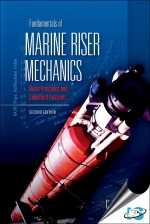Tab Article
Marine risers are unusual structures that defy standard engineering intuition, yet they are critical to the safety and structural integrity of offshore platforms. In this new edition of Fundamentals of Marine Riser Mechanics, the six new chapters, which have been added to the original fifteen, provide further arguments to support effective tension as well as original analysis of helical buckling. Analytical methods are used to model all phases of the development of helical buckling within a riser, associated with flexing of the pipe within the seabed BOP and down hole. An entire chapter is devoted to the Macondo accident of 2010.
Features and benefits of the new chapters and appendices included in the 2nd Edition:
- Further arguments that confirm the validity of the Effective Tension concept, based on analysis of real forces applied to the pipe walls by internal and external pressures
- Analysis of helically buckled pipes within casings, leading to exact expressions for all forces acting in and on a regular helix
- Analysis of helix end sections that connect a regular helix to a centralised end point on the casing axis, taking into account applied end moments (restoring or disturbing). Proof that such end sections must always include a transition section, in contact with the casing wall, linking the regular helix to the section out of contact with the casing wall.
- Analysis of drill-pipe deflection inside a seabed BOP and down hole, associated with helical buckling within a riser, with particular reference to the Macondo accident scenario.
- Discussion of how and when planar buckling transforms into helical buckling
- Appendices giving details of all required calculation methods
- Three new Excel files, added to the original seventeen, to allow readers to perform further calculations with their own data


